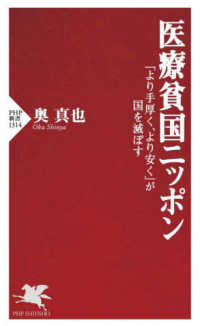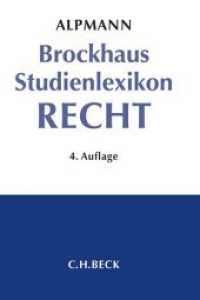- ホーム
- > 洋書
- > ドイツ書
- > Humanities, Arts & Music
- > Humanities
- > general surveys
Description
(Short description)
Der epochale Wandel um 1800 von Übersetzungskonzeptionen aus der Antike und neu entstandenen.
(Text)
Es gilt als gesichert, daß die aus der Antike überlieferten Auffassungen vom richtigen und schönen literarischen Übersetzen an der Wende zum 19. Jahrhundert von Grund auf in Frage gestellt wurden und so Platz für neue entstand. Dieser epochale Wandel wird hier erstmals aus internationaler Sicht untersucht. Erkennbar werden Gemeinsamkeiten und Unterschiede der drei damals besonders wichtigen nationalen Traditionen der französischen, britischen und deutschen. Auf mehreren Begriffsfeldern werden Übereinstimmungen zwischen den Ländern beziehungsweise Übernahmen aus einer Landestradition in eine andere dargestellt. Erweitert wird diese internationale Perspektive durch einen Beitrag von Harald Kittel, dessen Gegenstand Giacomo Leopardis kritischer Vergleich des Italienischen, Französischen und Deutschen als Übersetzungssprachen ist.
The views of what makes a literary translation correct und beautiful that had their origin in classical antiquity were radically called in question at the turn to the nineteenth century. Their decline and the rise of new concepts have been the subject of several studies of national scope. The present book is the first comparative survey of these events. The countries that contributed most to this monumental reorientation are France, Great Britain, and Germany. The comparative approach serves to determine what the three national traditions have in common and how they differ. A chapter is devoted to each country, followed by an investigation of key concepts and how they concurred, deviated, or influenced each other. This international perspective is broadened by Harald Kittel's examination of Giacomo Leopardi's comparison of Italian, French, and German as media for translation.
(Text)
The views of what makes a literary translation correct und beautiful that had their origin in classical antiquity were radically called in question at the turn to the nineteenth century. Their decline and the rise of new concepts have been the subject of several studies of national scope. The present book is the first comparative survey of these events. The countries that contributed most to this monumental reorientation are France, Great Britain, and Germany. The comparative approach serves to determine what the three national traditions have in common and how they differ. A chapter is devoted to each country, followed by an investigation of key concepts and how they concurred, deviated, or influenced each other. This international perspective is broadened by Harald Kittel's examination of Giacomo Leopardi's comparison of Italian, French, and German as media for translation.
(Author portrait)
Dr. Armin Paul Frank, emeritierter Professor für Englische Philologie, war Gründungssprecher des Göttinger Sonderforschungsbereichs »Die literarische Übersetzung« und Leiter des Projektbereichs des SFB »Internationalität nationaler Literaturen«.







